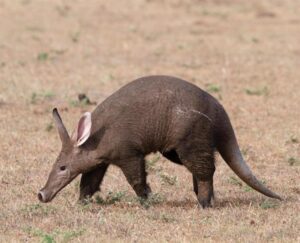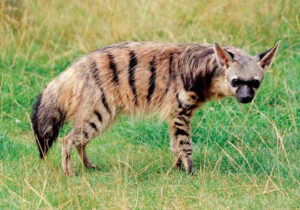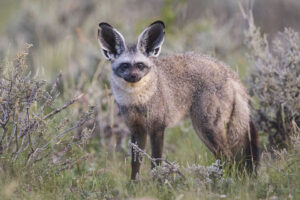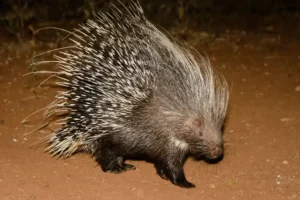Looking for something beyond the great big five, Naicef brings you the shy five in Kenya.
Explore an elusive, lesser-known group of animals that are often nocturnal and generally avoid human contact, making them difficult to spot.
Venture beyond the well-trodden trails and discover the enigmatic world of The Shy Five in Kenya: The Aardvark, Aardwolf, Bat-eared Fox, Porcupine, and Meerkat. These elusive creatures offer a truly unique Shy Five safari experience, revealing a different facet of Africa’s rich biodiversity.
Due to their elusive nature, it will be a rewarding adventure trying to spot them on a shy five safari as they shy away from you.
A shy five wildlife safari in Kenya offers the chance to connect with nature’s most secretive beings. Experience the best shy five wildlife package in Kenya with Naicef.
Simply reach out to us at my@naicef.com, call +254799922277, or,
Book Any Shy Five Tour Here
And for travelers seeking a truly unique adventure, a Shy five safari offers a thrilling twist to the traditional wildlife experience.
Who Are The Shy Five In Kenya?
In Kenya, where iconic savannahs meet rugged highlands and desert plains, a Shy Five wildlife safari offers the chance to connect with nature’s most secretive beings. So, who exactly are The Shy Five in Kenya?
Before you decide to embark on a shy five safari, get to learn and understand these elusive beings so you can know how to spot them.
Here are the shy five in Kenya that you will encounter on a shy five wildlife safari in Kenya.
1. Aardvark
The name aardvark comes from Afrikaans, meaning “earth pig’ as showcased by its nature and behavior.
Looking like a crossbreed between a pig, rabbit, and kangaroo, the aardvark is a nocturnal digger with a long snout and big claws. Have poor eyesight, especially during the day, but make up for it with an incredibly acute sense of smell and excellent hearing.
Emerging only at night, it is rarely seen, hence making it a prized sighting on any Kenya Shy Five safari tour.
It feeds mostly on termites and ants that it digs from the ground using its powerful claws, and they have a long, sticky, snake-like tongue that can extend up to 30 cm, perfect for catching termites and ants.
Aardvarks are found throughout sub-Saharan Africa, in a wide range of habitats including savannas, grasslands, woodlands, and even rainforests.
Interestingly, the aardvarks are the only surviving member of an ancient mammalian order {Tubulidentata} that evolved shortly after dinosaurs went into extinction, and are distinctly related to elephants.
For a Kenya shy five safari tour where you can spot the aardvark, visit places like;

Your best chance for a shy five safari with aardvark sightings can be on a night game drive accompanied by a guide who knows the local terrain properly.
2. Aardwolf
Often mistaken for a small, striped hyena, the aardwolf is, in fact, an insectivore, specializing in consuming termites and its name means “earth wolf” in Afrikaans.
Unlike its scavenging relatives, it boasts a delicate build and a long, sticky tongue perfectly suited for its specialized diet that it uses to lap up thousands of termites.
They are largely nocturnal and solitary foragers, making them a rare gem on any Shy Five wildlife safari in Kenya.
They prefer semi-arid, open plains, savannahs, bushland, and grasslands, but their distribution is highly dependent on the presence of their source of food.
On a shy five wildlife safari in Kenya, the aardwolf can be spotted in;
- Ol Pejeta Conservancy
- Masai Mara Conservancies
- Soysambu Conservancy
- Amboseli National Park
- Samburu National Reserve Area

The shy five wildlife package in Kenya that focuses on the Aardwolf can be booked during the dry season, where termite activity can be more concentrated, making them easier to locate.
3. Bat-eared Fox
True to its name, this fox is instantly recognizable by its extraordinarily large ears, which serve not only for excellent hearing to pinpoint underground insects, which are its main food source, but also for thermoregulation.
These small, social canids are primarily nocturnal, often seen in small family groups and flee away from human presence or as soon as they spot danger.
Their sandy-grey coat blends well into the savanna, hence they use it to camouflage themselves from predators and humans.
Often spotted in pairs, this shy canid is best viewed during dusk or at night in dry grasslands like those of Samburu and Laikipia, key regions for a tailored Shy Five wildlife package in Kenya.
Places to try and track down this adorable insectivore for a rewarding and unforgettable experience include;
- Samburu National Reserve
- Laikipia conservancies
- Ol Pejeta Conservancy
- Masai Mara National Reserve
- Tsavo East and Tsavo West National Parks

4. Porcupine
The porcupine earned its spot among the shy five in Kenya as it is primarily nocturnal, making daytime sightings a rare and special event for a shy five wildlife safari in Kenya.
The largest rodent in Africa, the porcupine is famous for its formidable defense mechanism, a coat of sharp quills. When threatened, it rattles its spine and charges backwards to attack predators.
Though widespread in Kenya’s forests and rocky regions, it is reclusive, often spotted only during a specialized Shy Five safari.
An experienced safari guide with knowledge of the locality and the preferred areas of porcupines will be your best asset for a shy five wildlife safari in Kenya.
Where to spot porcupines during a shy five wildlife package includes;
- Amboseli National Park
- Masai Mara National Reserve
- Tsavo West National Park
- Meru National Park
- Nairobi National Park
- Ol Kinyei Conservancy

5. Meerkat
Perhaps the most recognizable of the Shy Five in Kenya due to their charismatic upright stance, and not particularly shy in behavior, but they have a cautious lifestyle.
Meerkats are highly social mongooses living in cooperative groups called “mobs”; spotting their vigilant sentinels is a highlight of any Kenya Shy Five safari tour.
Spotting them in the wild, especially in Kenya’s northern deserts and semi-arid regions, takes timing, patience, and a knowledgeable guide.
Meerkats make excellent watchguards as one or more stand on their hind legs, trying to spot predators and take turns doing so.
Create complex tunnel systems beneath the ground for shelter and protection with multiple exits and chambers.
To increase your chance of spotting meerkats in Kenya, opt for a Shy Five Wildlife Safari package that includes night drives, early dawn excursions, and experienced local trackers and guides.
Where to see meerkats in Kenya;
- Tsavo West National Park
- Amboseli National Park
- Chyulu Hills National Park
- South Kitui National Reserve

Where To Go For A Shy Five Safari In Kenya
Embarking on a shy five wildlife package in Kenya requires a tailored approach and knowledge of their areas of habitancy, as they are often elusive in the face of human presence.
Naicef brings you a 3-Day Shy Five wildlife package in Kenya crafted to your ideal shy five wildlife safari in Kenya expectations and more.
Some key considerations for your Kenya Shy five safari tour include;
- Nocturnal focus
Embrace night game drives equipped with spotlights and led by Naicef expert tour guides, and enjoy a glimpse into the nocturnal world.
- Expert Guides
In order not to miss the elusive shy five in Kenya, an experienced, expert guide is recommended, as they know the locality and places these shy five love to hang out in. Their ability to interpret subtle signs, from tracks to burrow openings, significantly enhances your chances of a sighting.
- Patience and a firm Resolve
Be prepared for a quiet observation and remember luck plays a significant role in spotting the Shy five in Kenya. Encountering them is not guaranteed, hence the reward of a rare sighting is immeasurable.
Spotting the shy five in Kenya in one setting is rare and challenging in Kenya due to their nature. They are often found in remote and arid regions. Certain areas offer better opportunities for a shy five safari.
Here is a sample 3-Day Shy Five Wildlife Safari in Kenya
3-Day Shy Five Wildlife Package in Kenya
| Day | Activity | Expectation |
| 1 7 am-12 noon | Depart from Nairobi to Tsavo West National Park
| Pick up from Nairobi CBD and drive to Tsavo West National Park, enjoying scenic views on the drive via the Mombasa highway
|
| 12 noon-1 pm | Check in and lunch at the lodge | Get a welcome drink at the lodge, check in and have lunch, and get a briefing on the shy five safari |
| 1 pm- 4 pm | Afternoon game drive | Focus on the open Savannah areas, Shetani lava flow, for possible meerkat sightings and bat-eared foxes |
| 4 pm-6 pm | Relaxation | Head back to the lodge to relax after the long drive and tiresome day, have dinner, and overnight stay |
| 2 6 am-9 am | Early morning game drive | Visit areas near Chyulu hills, it’s a good time for meerkats emerging from burrows
|
| 9 am-10 am | Bush Breakfast | Enjoy a bush breakfast as you view the other animals in Tsavo West, you might also see the big five while at it |
| 10 am- 1 pm | Nature Walk | Go on a nature walk with a Maasai tracker and learn about burrows, animal behavior, and possible signs of porcupines or aardvark tunnels |
| 1 pm- 4 pm | Lunch | Have lunch with an optional birdwatching experience or leisurely enjoy your time at the spa or the lodge |
| 4 pm- 7 pm | Sundowner game drive | Focus on low-traffic areas where shy animals are more relaxed, such as the bat-eared fox, aardvark, and aardwolf. There can be an optional night drive after dinner |
| 7 pm- 8 pm | Dinner | Have dinner with meals of your choice, and later an overnight stay |
| 3 6 am-8 am | Final Dawn Game Drive | Last chance to spot any missing shy five members, including the porcupine |
| 8 am-9 am | Breakfast and check-out | Check out of the hotel after breakfast and get ready to leave |
| 9 am-2 pm | Departure | Depart for Nairobi |
Other Naicef Safari tour packages for a great adventure include;
- 3 Days Ol Pejeta Package
- 2 Days Masai Mara Safari Packages
- 5 Days Big Five Safari Package
- 6 Days Kenya Safari Tour Package
Best Time to Uncover the Shy Five
The dry season in Kenya, typically from June to October, offers optimal conditions for a Kenya Shy Five safari tour. During this period, there is thinner vegetation, waterhole concentration, and cooler nights, making animal activity more frequent and visible.
In choosing Naicef for a reputable shy five wildlife package in Kenya, you directly contribute to sustainability.
Check out also our sustainable travel guide, including;
- 2025 Top Best Sustainable Travel Destinations in Kenya
- Best Eco Tourism Practices for Hotels, Tour Companies & Professionals
- Sustainable Travel Tips to Africa
- Top Ecotourism Destinations & Projects in Kenya: Pioneering Eco Tourism in Africa
Conclusion
In conclusion, a Shy Five wildlife safari in Kenya is more than just a wildlife viewing trip; it’s an immersion into the subtler, more intricate rhythms of the African bush. The shy five in Kenya demand patience and keen observation.
A shy five safari promises an unforgettable and rewarding journey into the hidden wonders of the wild.
For a truly unique African adventure, a shy five wildlife package in Kenya by Naicef is the best option to choose from.
For more information contact Naicef at my@naicef.com, call +254799922277, or simply
Book Any Shy Five Tour Here
Frequently Asked Questions
1. Why visit Kenya for a shy five wildlife safari?
Diverse ecosystems, eco-conscious travel, and specialized trackers make Kenya one of the few African countries where you can enjoy both the traditional Big Five safari and a more specialized shy five safari.
2. What are the top destinations for a Kenya shy five safari tour?
The top destinations for a shy five wildlife package in Kenya include: Lewa Wildlife Conservancy, Tsavo West National Park, Ol Pejeta Conservancy, Taita Hills, Masai Mara, and Samburu National Reserve.
3. What are some tips for spotting the shy five?
Tips for spotting the shy five include: opting for night game drives, hiring expert local guides, being quiet and patient, and traveling during the dry season.
4. What are the shy five in Kenya?
The shy five in Kenya are: meerkats, porcupines, aardvarks, aardwolves, and the bat-eared fox.
5. Why are they called the shy five?
They are called the shy five because they are extremely elusive, mostly active at night, secretive, shy, and often underground.




